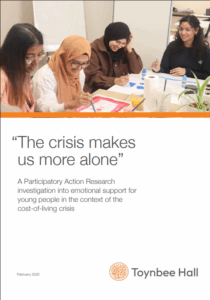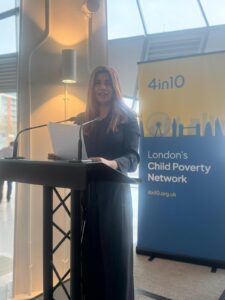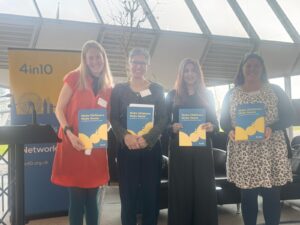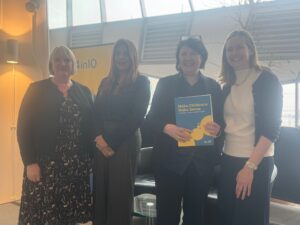The emotional toll of poverty on children, young people and families
This blog is adapted from a LinkedIn post published by our Strategic Programme Manager, Katherine Hill to mark Mental Health Awareness Week 2025
“I feel anxious all the time, like I’m riding a rollercoaster…”
That’s how one parent in London recently described life with young children.
But it wasn’t sleepless nights or toddler tantrums they were talking about — it was poverty.

This Mental Health Awareness Week, I want to highlight two powerful reports published recently by members of 4in10 London's Child Poverty Network that make something crystal clear: poverty doesn’t just affect bank balances — it affects mental health, emotional resilience, and how people experience the world around them.
Last week, Home-Start London released new research based on interviews with families supported by local Home-Starts across the city. The picture they paint is tough.
- Nearly 9 in 10 families (86%) say that money worries are making parenting harder.
- 81% feel anxious or stressed because of financial pressure.
- And 6 in 10 say it increases their sense of isolation.
“Rent is always our priority, then bills. But in London, the price of everything is going up. It’s been a challenge — we’ve had to go to our local food bank.”
Parent interview
 Earlier this year, Toynbee Hall published “The crisis makes us more alone”, a report led by 12 brilliant young peer researchers from low-income backgrounds in Tower Hamlets. Their work explores how the cost-of-living crisis is affecting young people’s mental health. The findings are just as powerful and just as worrying:
Earlier this year, Toynbee Hall published “The crisis makes us more alone”, a report led by 12 brilliant young peer researchers from low-income backgrounds in Tower Hamlets. Their work explores how the cost-of-living crisis is affecting young people’s mental health. The findings are just as powerful and just as worrying:
- Over half of the young people surveyed had experienced rising stress within their immediate families.
- Nearly half said their own mental health was getting worse.
- These issues are compounded by financial insecurity, overcrowded housing, and insufficient mental health services, creating a web of challenges that many struggle to navigate.
These two reports, focusing on different stages of young lives, tell the same story: poverty and poor mental health are deeply intertwined.
Struggling to make ends meet doesn’t just fray people’s nerves, it isolates them and makes it harder to access help.
But there is hope - and it lives in our communities. Both pieces of research show the crucial role voluntary and community organisations play in offering support, connection, and understanding. These are the safety nets too often missing or even undermined from national policy.
We don’t need any more proof that poverty damages lives. What we need is action. We need policies that recognise that mental health isn’t just about individual resilience - it’s about the social and economic conditions we create.
'Make Childcare Make Sense' conference at City Hall (21 January 2025)
 Last week, we were thrilled to host our ‘Make Childcare Make Sense’ conference at City Hall, generously hosted by London Assembly Member Marina Ahmad. This event marked the culmination of two years of dedicated work, focused on the challenges families on low incomes in London face when trying to access affordable childcare.
Last week, we were thrilled to host our ‘Make Childcare Make Sense’ conference at City Hall, generously hosted by London Assembly Member Marina Ahmad. This event marked the culmination of two years of dedicated work, focused on the challenges families on low incomes in London face when trying to access affordable childcare.
Our work was driven by an urgent and growing concern—raised both within and beyond our network—that the soaring cost of childcare is a key driver of child poverty in London, rivalled only by housing costs. In response, we partnered with our network members to investigate these experiences in depth. The findings are detailed in our report, Make Childcare Make Sense for Families on Low Incomes in London, published in March 2024.
The report revealed that the current childcare system is failing families. Many funding entitlements are inaccessible due to required ‘top-ups,’ inflexible policies that don’t accommodate diverse circumstances, and a lack of inclusivity for all children. Parents deeply value childcare, but they find the system frustratingly complex and overwhelmingly expensive.
These findings align closely with other key reports published around the same time, including the London Assembly Economy Committee’s Early Years Childcare in London and Business LDN’s No Kidding: How Transforming Childcare Can Boost the Economy. 
Our event last week, which was attended by a wide range of stakeholders, took stock of the situation nearly a year on. We heard powerful contributions from members of the Childcare for All campaign group about their lived experiences of childcare when you have no recourse to public funds, from Single Parents Rights Network and KIDS, who support families with disabled children to access childcare. All had clear and very pragmatic suggestions about how the system could do much better to support the groups they represent.
Rosa Schling from On the Record delivered a fascinating presentation on historical childcare campaigns, including the National Child Care Campaign of 1985, which called for “comprehensive, flexible, free, and democratically controlled childcare facilities funded by the state.” It’s striking how closely this aligns with what the parents we spoke to today still need and want.
We also heard from Sarah Ronan of the Early Education and Childcare Coalition and June O’Sullivan from LEYF, both of whom made a compelling case for an urgent policy shift. They emphasized that while the Government is making significant investments in early years education, these investments are failing to reach the most disadvantaged children. Failing to address this is an untenable position for a government that is committed to both reducing child poverty and improving early childhood development.

Finally, we were delighted that Joanne McCartney, Deputy Mayor for Children and Families was able to attend and address the conference; to hear directly from families, practitioners and researchers about the current challenges and we look forward to continued dialogue with her and the Mayor about what the GLA can be doing to both support the childcare sector and families and children to benefit from it.
If you couldn’t join us last week, we truly missed you—and we can confidently say you missed out too! But don’t worry—you can still be part of the conversation. Watch our campaign film, where parents dare to dream of a future where childcare is accessible to all children, free and on an equal basis: https://4in10.org.uk/make-childcare-make-sense-a-4in10-film/.

